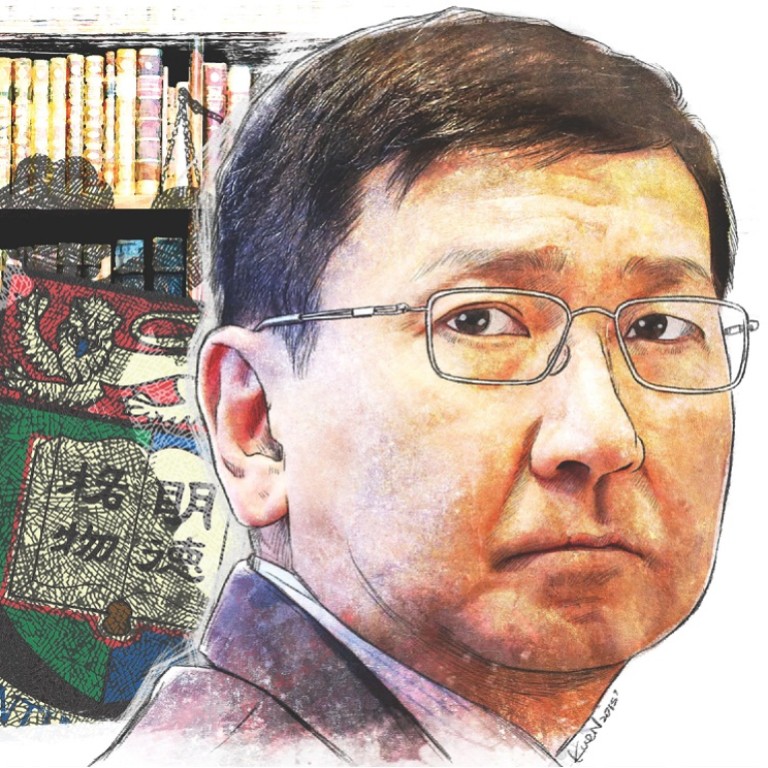
Professor Johannes Chan, the 'meddle' man at centre of HKU row
Accused professor came up with reform compromise and was big on mainland academic links
At the University of Cambridge in Britain last week, Johannes Chan Man-mun appeared relaxed, cracking jokes with students while delivering a speech on "one country, two systems", the rule governing Hong Kong's relationship with the mainland, and a subject he has studied for years.
Chan, dean of law at the University of Hong Kong until last year, showed no sign that the recent ferocious attack from the leftist press had stung him.
Well-known for his moderate political stance, even some pro-establishment figures balked at the campaign mounted against him by Beijing-friendly . The newspaper blasted Chan for "meddling in politics" and claimed the HKU law school had seen a deterioration in the quality of its research during his 12 years at the helm, citing the results of an assessment exercise which has yet to be published.
The campaign endured two weeks - with three pages criticising Chan on day one alone - and seemed aimed at blocking his expected appointment to a top managerial position at HKU.
A government adviser then admitted discussing with certain people Chan's suitability for the post of pro-vice-chancellor.
When asked what he would do if he was not selected for the job, Chan, 56, told the : "It doesn't matter. Few academics go into universities for administrative jobs. I just want to make a contribution."
A human rights and constitutional law specialist, Chan once said being dean of law meant he was "the CEO of a public institution who is expected or has to pretend to know everything", handling subjects from research to construction.
Under his leadership, the faculty may have nurtured activists such as Benny Tai Yiu-ting, who dreamt up Occupy Central - Chan even wrote a foreword for his book - but, according to Zhang Xianchu, ex-associate law dean , he never let his political views interfere with his work.
"Johannes is a passionate man. He has been very keen in promoting academic exchange between Hong Kong and the mainland," said Zhang, a mainlander. "We never had to worry about lack of funding for the China programme."
He added Chan was not interested in winning friends in high places. "He is a bookish person; when we go to the mainland, he doesn't hang out for food and wine or go to meet the cadre. He doesn't usually stay overnight."
Chan sits on the Hong Kong 2020 think tank launched by Anson Chan Fang On-sang, a former chief secretary. She said: "He is principled and open-minded. He can look at issues from the widest possible angle. His proposals are always well argued."
In a proposal for political reform during last year's consultation on the 2017 chief executive election, Johannes Chan called for a 160-member nominating committee that would include 18 directly elected representatives from each of the city's 18 districts.
While Beijing is against the public being able to nominate the candidates who can stand in the city's first one-man one-vote election, there was acknowledgement from the pro-establishment camp that his proposal complied with the Basic Law.
In the 1980s, when Chan became the law school's second ethnic Chinese teacher after Professor Albert Chen Hung-yee, he quickly became popular among students, recalled Eric Cheung Tat-ming.
Cheung, who went from being one of Chan's students to one of his colleagues, said: "He joined HKU when I was in year two. He's such an approachable person and he liked interacting with us. We often went to him to seek advice on our activities, spending a lot of time together in the canteen."
He added that Chan was "instrumental" in pushing through the Bill of Rights Ordinance, the key legislation to protect human rights enacted six years before the 1997 handover.
The professor is Hong Kong's only honorary senior counsel, a title awarded to scholars who are practising barristers and are considered as "providing distinguished service" to the law. "This is a singular honour, for it is very hard to excel in both academia and the Bar," said Audrey Eu Yuet-mee SC, who worked alongside Chan in the Article 45 Concern Group founded in 2003 to monitor the government's actions on political reform.
While Chan has not taken on many litigations, all the cases he has worked on, whether they involved human rights or constitutional law, were highly significant, Eu said.
Chan's commitment to human rights has, at times, displeased those who do not welcome mainlanders arriving in the city. In 2013, Chan helped mainlander Kong Yunming, then aged 64, win her fight for social security benefits despite not meeting the seven-year residency requirement.
He convinced the judges of the Court of Final Appeal that it was unconstitutional to deny social security to new migrants. But his argument for new "economic and social rights" was not accepted.
In Cambridge, the professor said any press campaign against him would not deter him from his work. But he was worried about Beijing's own meddling in the city's rule of law, from various quarters.
"Beijing is not a homogeneous body, and there are many factors," said Chan.
"I am not optimistic [about curbing mainland interference] but we should try our best. When we see injustice, we should speak up," he added.
Johannes Chan
56
Married
University of Hong Kong law professor and honorary senior counsel
HKU law dean (2002-14)
On the staff of the Secretariat of the European Commission of Human Rights, Strasbourg, France (1989)
Has sat on the following:
- Law reform sub-committee on privacy (2001-06)
- Bar Council of the Bar Association
- Central Policy Unit (1994-96)
- Committee of Experts, International Committee of the Red Cross, Geneva (1993)
- Founding member of Human Rights Monitor (1995-present)

